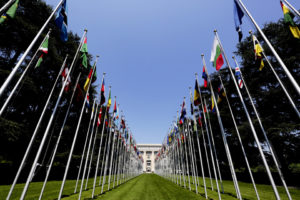
The pandemic is far from over. For at least the first part of 2021, it’ll still be impossible to hold large-scale in-person meetings in Geneva, or to travel easily. We also have to work out how to catch up on the work that was delayed last year, and what the knock-on effects for this year will be. Still, we’re looking forward to getting back to in-person meetings as soon as possible. Online tools have allowed us to keep the wheels turning. But diplomacy is a face-to-face business, and for the most difficult or sensitive subjects there’s no substitute for in-person discussions to find common ground and to move us forward.
Three conventions bore the brunt of the disruption last year. The Convention on Certain Conventional Weapons and the Biological Weapons Convention couldn’t complete their cycles, due to objections to holding expert meetings virtually. Both are due to hold Review Conferences at the end of 2021; the question is whether we’re able to make up the lost time or whether they need to be postponed to 2022.
The other was the Nuclear Non-Proliferation Treaty, whose 2020 Review Conference was postponed not once, but twice, and is now due to take place in New York in August. Assuming it goes ahead, that will of course be a major event. We’ll work hard with the President-designate and his team to pick up the preparations that were curtailed last spring. Global nuclear politics haven’t been suspended during the pandemic, so we’ll all need to work to understand how the environment has changed, and what that means for our deliberations at the RevCon.
On the conventional weapons side, my focus this year will be the Convention on Cluster Munitions. The UK assumes the Presidency after the Second Review Conference through to the 10th Meeting of States Parties in September. The RevCon began in virtual format in November, but the in-person session in early February to finalise the outcome documents must now be in doubt.
There’s also lots to do on outer space security, following the UN General Assembly’s adoption of the UK-sponsored resolution (75/36) on reducing space threats. The Secretary-General has already written to Member States requesting input to the report he’s mandated to produce. As well as preparing our own national submission, we’ll be talking to other countries and civil society about the issues we hope the report will cover. Once the report is published in August, we’ll need to work quickly to get the follow-up draft resolution ready for this year’s First Committee in October.
More immediately, the Conference on Disarmament holds its first meeting of 2021 next Tuesday, meeting fully online for the first time. We’ll support Belgium and the rest of this year’s Presidents to adopt a Programme of Work, building on the superb efforts of last year’s six Presidencies. If it goes ahead, though, the NPT RevCon will take a big chunk of the third part of the CD’s session; we’ll need to make the most of our time for the rest of the year.
